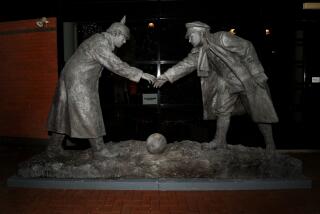Opening Boxes the Day After Christmas
- Share via
Today, as my foreign-born desk calendar reminds me, is Boxing Day in the British Isles. The originating idea was that this was the day the haves distributed boxes of food and other useful items to their servants and other have-nots.
It has always seemed to me that only in a society as vigorously stratified as Britain’s has been (and to some extent still is) would the idea of a kind of a Christmas II just for the servants be found appropriate. It was a terribly decent thought, but you don’t wonder that it hasn’t taken root elsewhere. Servants, in national quantities, are hard to find.
By a nice historical twist, Boxing Day has now become a latter-time pleasure of British life. Having, I presume, lost all or almost all of its founding intention, it survives as a wonderful way of making the actual observance of Christmas last two days instead of only one.
There is none of that awful dragging back to the office with several hundred calories’ worth of fruitcake sitting in the bottom of your stomach like so many bright silver dollars, as Bob and Ray used to say. There is an extra day to let your metabolism simmer down. The clerks in department stores have an extra day to compose themselves before the flood tide of fuzzy slippers and misjudged haberdashery arrives to be exchanged for what had been hoped for in the first instance.
Television in Britian is alive with special attractions on the 26th, the kind you can watch without strain, through heavy-lidded eyes. As late as the mid-’60s, John Huston’s shaggy comedy, “Beat the Devil,” was a perennial BBC offering on Christmas or Boxing Day, a present to be cherished by either the haves or the have-nots. Frank Capra’s “It’s a Wonderful Life,” which has become an international carrier of the Christmas spirit, was also available.
Holidays and birthdays acquire a sharp second edge when you find yourself in foreign surroundings. In 1944 I spent Christmas Eve, and indeed Christmas and Boxing Day, in a tent city outside Southampton, waiting to board an LST for Le Havre. It was bitterly cold, cold enough to feel like Christmas in Upstate New York.
And there was something comforting about being able to catch sights and sounds of Christmas observance amid the wartime gray of that English city. Christmas is a universal day, more secular every year, but the universality meant a lot amid the dank and penetrating chill and the anxieties of the time.
Years later I spent three Thanksgivings and three Fourth of Julys in London, and discovered that there is nothing like a national holiday spent abroad to remind you that you are a long way from home and on alien soil even if it’s friendly. There was no trouble getting turkeys, but as I remember the cranberry sauce was a problem.
The great holidays are the punctuations of our years; memories crowd in, but the view is forward as well, and it is impossible not to hear a meter ticking in the mind’s ear, time tiptoeing along a bit faster than you’d thought it was.
This holiday season has been uncommonly contrasty, the world’s good news unusually good, the horrors of Panama--a society disintegrating in anarchy--suddenly horrific and ominous. You grieve for brave young lives lost, and for innocent bystanders becoming part of the toll.
But you have to believe, not least on so buoyant an occasion as the Christmas season, that perspective--a sense of the long past and the long future--is required. Nothing is ever really simple, and not much is forever, not even the divisions of the world. Boxing Day revealed the generous instincts of a society that was also divided, often cruelly, along class lines; and now that holiday is a sort of anachronistic gift, an extra day off, for the society at large.
A special case can be made, in fact, that Boxing Day wouldn’t be a bad addition to the American calendar, even now. Another day off, to be sure, but a holiday committed to the ancient originating idea of attention, not to the servants but to the have-nots, the disenfranchised--and a summoning of resources for the homeless.
More to Read
Sign up for The Wild
We’ll help you find the best places to hike, bike and run, as well as the perfect silent spots for meditation and yoga.
You may occasionally receive promotional content from the Los Angeles Times.





